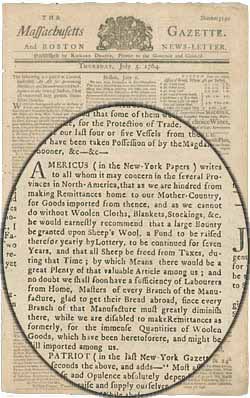Collections Online
"Americus (in the New-York Papers) writes ..."
To order an image, navigate to the full
display and click "request this image"
on the blue toolbar.
-
Choose an alternate description of this item written for these projects:
- Main description
[ This description is from the project: Coming of the American Revolution ]
Two anonymous columns written from New York discussing the constraints the Sugar Act has put on colonial trade. One argues that essentials for survival such as clothing should not be taxed, while the other posits that supporting industry and manufacturing in the colonies, instead of relying on imports, will help preserve the local economy.
Becoming the "richest People upon Earth"
As members of the British empire, colonists have enjoyed the fruits of its robust, far-flung trade. As a quick glance through any newspaper will show, an array of goods are on offer in colonial markets: Cadiz salt; raisins; Madeira wine; rum from Barbados and Jamaica; coffee, cocoa, and Bohea tea; French indigo; watercolors and India ink; spermaceti candles; music and instruments; shoes and bonnets; travel books, poetry, and novels. As colonists worry about the constraints England has imposed on their trade and their currency, they reflect on the necessities of life and how to secure them.
To examine the whole newspaper, please see the online display of The Massachusetts Gazette and Boston News-Letter, 5 July 1764.
Questions to Consider
1. What necessity does Americus identify? Explain his scheme for producing raw materials. Who will be responsible for manufacturing the goods?
2. According to Patriot, how do a people become the "richest on earth"? How does he propose getting beyond the colonists' "present gloomy fears"? Who is setting a good example?
Further Exploration
3. Are you surprised at the number and/or types of goods advertised in the four pages of the 5 July 1764 issue of the Massachusetts Gazette and Boston News-Letter? Why or why not? Create an advertisement for one of the "exotic" goods listed.
4. Why do you think that one writer uses the pseudonym "Americus"?

